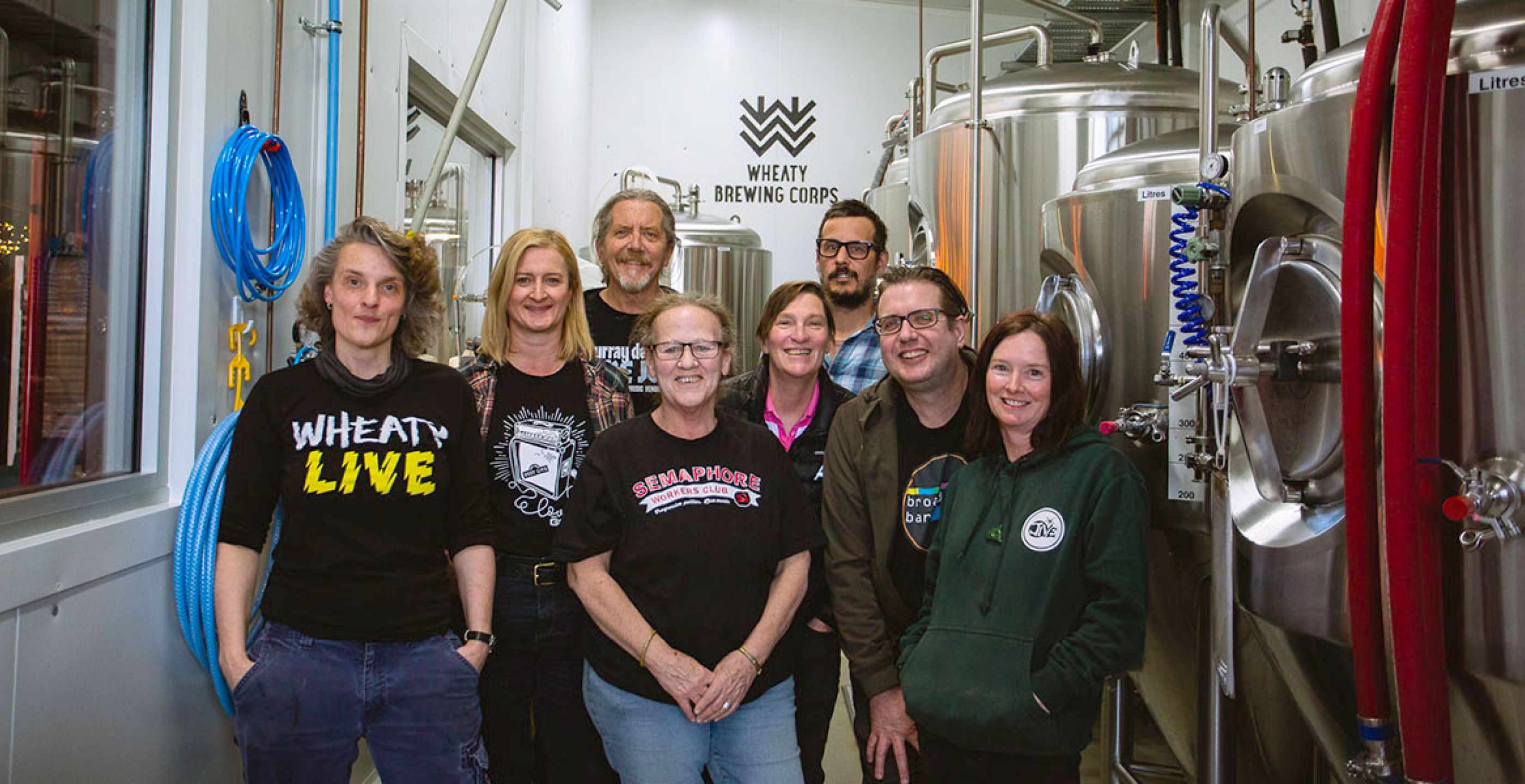There’s plenty that connects craft beer and live music. They’re fields in which creativity flourishes, can be a wonderful way to bring people together and – while this might be editorialising somewhat – are best enjoyed together.
Unfortunately, in 2023, neither industry is looking all that healthy. If rising costs combined with a cut in consumer spending and the dominance of a tiny number of powerful multinationals sound familiar to anyone keeping a keen eye on the craft beer industry in 2023, it's a situation reflected in the world of live music.
Jade Flavell (above left), who has spent two decades supporting local musicians alongside craft beer at The Wheatsheaf Hotel – better known as The Wheaty, says that for owner-operated venues in South Australia, it represents the toughest trading period they can remember.
The situation has led a collection of them to form the Independent Live Venues Alliance (ILVA). Alongside The Wheaty stand Jive, Grace Emily Hotel and Broadcast Bar, The Governor Hindmarsh, Semaphore Workers Club and Murray Delta Juke Joint on the Fleurieu Peninsula.
“It’s an alliance of like-minded, owner-operated, pokie-free, grassroots live music venues,” Jade told The Crafty Pint.
The venue owners behind the new organisation have known each other for a long time and first floated the idea of launching such a venture during the height of COVID. As a collective, ILVA’s focus is on sharing the reality of operating a live music venue in the current climate while advocating for support from both the government and gig-goers.
Jade believes it's the first such organisation in Australia, one heavily inspired by the UK’s Music Venue Trust, and says they're eager to support similar associations launching in others states. The UK looks set to lose around ten percent of its grassroots venues in 2023 and Jade says the situation is similar here, where the “big three” international-based music businesses, Live Nation, TEG and UEG, have been buying ticketing companies, music agencies, venues and festivals.
Jade points to the important role owner-operated venues have in the cultural ecosystem of live music, with band rooms like The Wheaty’s often giving acts their first, second and tenth gigs, and at times hosting acts for just 20 or so people.
“What we do every day is a central part of the industry,” she says. “We’re incubators in every sense, we’re the lifeblood of the music industry.”

Adding to their difficulties is South Australia’s focus on supporting large festivals post-COVID; Jade says they make headlines but the benefits don't flow through to smaller venues or smaller acts. The AFL’s Gather Round earlier in the year turned out to be one of the quietest weekends in The Wheaty’s history, and other indie breweries and distilleries experienced similar patronage.
“Festivals are a sugar hit and it doesn’t have a trickledown effect,” Jade says, “particularly in an environment where people are going out less and spending less.”
The lack of consumer spending and increased costs are just a few of many ways Jade likens the live music industry's challenges to those facing craft beer, and points to the impact of having so much power concentrated in the hands of relatively few companies.
“Consolidation is one thing and, obviously, that's been hitting beer for a long time,” Jade says. “There’s indie washing, which is like craft washing.
“It’s not meant to be easy to know who owns what. There are venues that very much present themselves as being locally-owned, Aussie companies with the venues having their own character and doing things their own way.”
Jade says it means they can price other venues out of the market as they build dominance; she even wonders if they’ll turn to beer production to further save on the cost of running venues.
“I’m kind of waiting for Live Nation to buy a brewery to tie it all together and complete the circle,” she says.

Part of ILVA’s focus is helping punters understand which live music venues are owner-operated, in a manner Jade compares to the Independent Brewers Association and their indie seal.
“It’s the same deal; we’re saying support indie venues,” she says. “Support a grassroots venue that’s a local business, that’s owner-operated, and where the profits stay here unlike our multinational brethren.”
They’re also eager to develop ways to support musicians and other creatives who are struggling to make a living, for example through normalising tipping musos through the venue in an initiative floated by a Melbourne muso called “One For The Band”.
“You’ve watched a great gig, you don’t need another t-shirt or the vinyl, but you want to support the band,” Jade explains.
To kick things off, they’ve launched a music festival that kicks off on Thursday (October 19) and runs through the weekend. Everyday Festival has received support from the South Australian government and takes place across four days with seven venues hosting 14 gigs. In other words, it's quite similar to how a standard weekend works in each venue.
“It’s very much making the point that this is what we do every day,” Jade says.
But one difference this weekend is a beer of its own: a Bohemian pilsner called Czech One Two that will be pouring at each venue. Like a lot of Wheaty Brewing Corps releases, the name features a fun pun but Jade points out that their cause is deadly serious; she says once any live music venues closes, they tend not to come back.
“Unless something is done, we will lose venues,” she says. “If we’re not careful, we’ll get the culture we deserve. Which is pretty terrifying.”
You can find the details of Everyday Festival here. All photos are by Evie Wonder.















